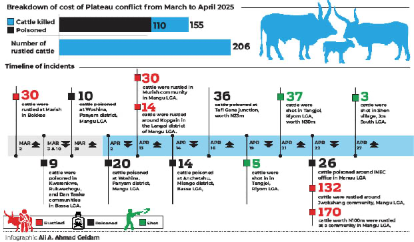
A devastating wave of violence has left cattle herders in Plateau State reeling from losses exceeding N300 million over just two months. Between March and April 2025, communities across Bokkos, Bassa, Riyom, Jos South and Mangu local government areas witnessed a disturbing pattern of livestock poisoning, shootings and rustling that has crippled the economic lifeline of herding families.
The crisis unfolded through multiple tragic incidents that collectively paint a picture of a brewing humanitarian disaster. Herders reported at least 110 cattle dying from poisoning, with toxic substances allegedly hidden in garden eggs, mangoes and water sources frequented by livestock. In one particularly heartbreaking case, 36 cattle worth N33 million perished after consuming poisoned mangoes near an INEC office in Mangu local government area. The animals reportedly belonged mostly to orphans under the care of Alhaji Nyako Muhammad, who described the loss as catastrophic for his extended family.
Gun violence also took a heavy toll, with 45 cattle shot dead in various attacks. Bashiru Haruna lost 37 cattle worth over N30 million in Riyom local government area, an economic blow that left his family destitute. The violence turned deadly in Shen village of Jos South, where gunmen killed three cattle and their herder, Hamza Suleiman.
Perhaps most devastating has been the rustling epidemic, with 206 cattle stolen in brazen attacks. In Mangu alone, armed gangs made off with 132 cattle from Jwokshang community and another 30 from Murish, where one herder remains missing. Shagari Manu recounted losing 170 livestock worth more than N100 million in rustling incidents that have left multiple families without means of survival.
The Miyetti Allah Cattle Breeders Association of Nigeria (MACBAN) has documented these incidents and appealed for government intervention. State chairman Ibrahim Yusuf Babayo confirmed that all attacks have been reported to security agencies including the military’s Operation Safe Haven, police and Department of State Services. While security personnel have visited attack sites, herders say the violence continues unabated.
The crisis has drawn attention from Nigeria’s highest security echelons, with the Inspector-General of Police, Chief of Army Staff and National Security Adviser all visiting Plateau State to assess the situation. The state government has formed an investigative committee into the poisoning allegations, but affected herders say they need immediate economic relief and better protection.
For families like Ismail Idris’s, who lost N23 million worth of cattle to poisoning, the future appears bleak. “This was our entire livelihood,” Idris lamented. “My children’s education, our survival – all gone.” Similar stories echo across Plateau’s herding communities, where the current crisis threatens to deepen existing tensions between farmers and pastoralists.
As investigations continue, the staggering economic losses and human toll highlight the urgent need for conflict resolution and economic support programs. With no clear end in sight to the violence, Plateau State faces growing humanitarian and security challenges that could have lasting consequences for regional stability.








